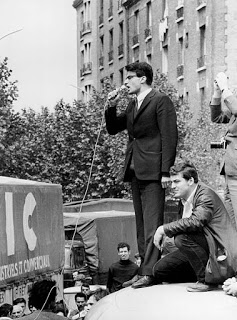Trotskyist vote in perspective
“France — 200,000 vote for workers’ control”, declared Socialist Worker (June 5) reporting the presidential election results. “235,000 Say Revolution Now” was how Black Dwarf (June 14) put it.
Alain Krivine, the trotskyist candidate, had polled 236,263 votes in metropolitan

France—a mere one per cent. Despite the fact that this confirmed our analysis of the May events—that a revolutionary situation did not exist because very few French workers really understood and wanted Socialism —the British trotskyist papers were exhilarated by the result:
. . . the people who voted for Krivine can stand up and be counted for what they really are: men and women who have made a complete break with all the parliamentary parties, with their illusions of creeping socialism or bourgeois concepts of law and order. To vote for Krivine signifies an awareness of the necessity for revolution in France and a willingness to work for it. There are in Metropolitan France 235,000 revolutionaries who voted for a Trotskyist candidate and double that number if the disenfranchised foreigners, younger students, workers, and school children are included (Black Dwarf)
Only Krivine stood for the abolition of the sham system of parliamentary democracy, for workers’ power as the alternative to capitalism . . . The campaign was a tremendous opportunity for using the machinery of the capitalist state in order to expose it. Krivine appeared on television with as much time as every other candidate—and hammered the need for revolution. His election address was delivered to every voter at the state’s expense (Socialist Worker)
We are sorry to dampen their ardour but let us put the whole thing in perspective. The vote for ‘workers’ control’ and for ‘revolution’ was minimal. Krivine polled about the same percentage as SPGB candidates have consistently done in national and local elections here. In addition, it has been our experience that on so low a percentage vote more than half our votes were cast by chance or in error so that the total vote cannot be regarded as an accurate measure of the real support for Socialism.
When in 1967 we contested four boroughs in the Greater London Council elections, putting up 14 candidates, the votes and percentages (taking those for the top candidate of each party) were:
Conservative 166,358 52.1
Labour 120,735 37.7
Liberal 18,033 5.6
Communist 7,847 2.4
Socialist 4,796 1.5
Others 2,164 0.7
(At this time the trotskyist vote was included in that for the Labour Party.)
